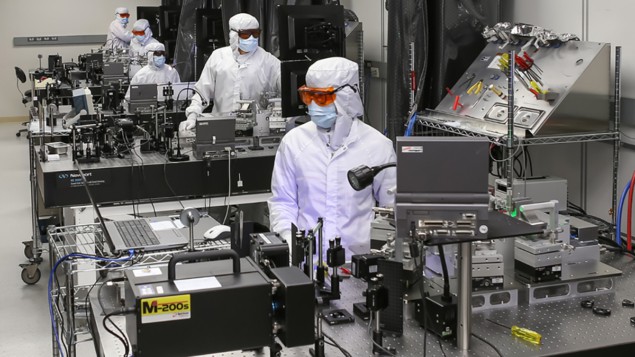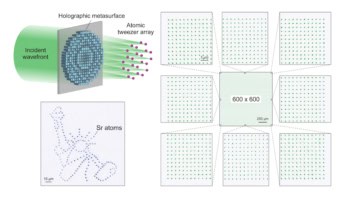James McKenzie celebrates firms in photonics and instrumentation that have won business awards from the Institute of Physics in 2023

Last month I highlighted some of the medical-physics companies that won business innovation awards from the Institute of Physics in 2023. But firms in the photonics and instrumentation sectors have done well too, which is perhaps not surprising given that photonics is one of the UK’s largest physics-based industries. As the Photonics Leadership Group (PLG) said in a recent statement, the UK photonics sector is now worth £15.2bn, with like-for-like revenue growth of more than 7% between 2020 and 2022.
Having sat on the judging panel for the IOP’s business awards, I can say that there were some fantastic entries
The PLG, which includes representatives from more than 60 photonics businesses in the UK, says that there is increased demand for photonics in everything from agriculture, health and communications to defence, satellites and manufacturing. It also points to an increasing commercialization of the burgeoning quantum-technology sector. Indeed, the PLG forecasts that the UK photonics sector will be worth more than £17bn in 2024 and grow to £50bn by 2035.
Having sat on the judging panel for the IOP’s business awards, I can say that there were some fantastic entries, which meant that picking winners wasn’t easy. In no particular order, however, the first winner I’d like to mention is Glasgow-based Coherent Scotland, which makes ultrafast lasers for applications in the life sciences and industry. The firm’s philosophy is to transform complex, physics-based optical technology into equipment that’s easy to use, even by people who aren’t laser experts. Their award recognizes in particular the company’s Axon range of femtosecond lasers, which it has developed over the last six years.
Operating at three wavelengths that are of particular use in biology (780, 920 and 1064 nm), the lasers can be easily fitted into existing imaging and industrial tools where space is at a premium. They exploit the technique of chirped pulse amplification – which was recognized by the 2018 Nobel Prize for Physics – by taking short, low-power pulses and stretching them out in time. The pulses, which now have a lower peak power, can then be safely amplified before being recompressed into short, higher-peak-power pulses.
Traditionally, this technique is only ever found in large, facility-sized laser systems. But the Axon lasers, being so small, have already been used by neuroscientists for in-vivo brain imaging and studying neurodegenerative diseases such as Alzheimer’s and Parkinson’s. Other applications include cancer diagnostics and drug research, pharmaceutical testing, tropical-disease control and immunology. The future looks bright for the physics of ultrafast laser technology in the biological sciences.
Space success
Another winner is KEIT Industrial Analytics. Based at Harwell in Oxfordshire, it makes infrared Fourier transform spectrometers for monitoring and controlling industrial production processes. The technology was originally conceived at the Rutherford Appleton Laboratory in the late 2000s as a compact, rugged high-performance instrument for analysing the atmosphere of Mars. KEIT was spun out of the Rutherford lab in 2012.
Containing no moving parts, the company’s spectrometers use simple optics to generate an interferogram along a detector array. The data can then be Fourier transformed to return the whole spectrum, creating a robust instrument that can be used directly for instantaneous in-line analysis in production plants. That in turn offers real-time spectral data as opposed to delayed, off-line sample analysis which has huge advantages in process control applications on yield and product quality.
KEIT’s technology is sold around the world to companies that use it for in-situ monitoring of everything from bioethanol and biofuels production to pulp and paper manufacturing. With the global analytical instruments market expected to grow at almost 4% a year to $71.4bn by 2027, I think KEIT has a bright future. The original Rutherford technology continues to be developed for future off-planet missions so watch this space.
Focal Point Positioning, meanwhile, won a 2023 IOP business award for its pioneering location-awareness technology. Based in Cambridge, the company was founded in 2015 by the physicist Ramsey Faragher, who was once dubbed “the real life Q” – in a nod to James Bond’s R&D guru – by Top Gear magazine. Faragher invented a technology that improves the accuracy, sensitivity and security of devices that use location data from global-navigation satellite systems (GNSS).
GNSS is a massive business area. More than $1trillion of the US economy and over €800bn of the European economy currently depends on this incredible positioning and timing system. However, GNSS is not perfect, especially in cities, where signals can bounce off buildings, causing location-technology devices – in anything from cars to mobile phones – to be inaccurate. It’s why the blue dot on your GoogleMaps can be in the wrong place or why your Uber driver can’t find you.
The company’s “Supercorrelation” technology gets round this problem by working out the direction of incoming signals through special software rather than needing costly antennas or other infrastructure. By detecting – and ignoring – fake signals, and recognizing reflected signals, the company’s technology allows metre-level positioning to be maintained on smartwatches, fitness devices and other consumer products even in the trickiest environments.
Meet five medical companies that have received 2023 business awards from the Institute of Physics
The company has more than 25 patent families and four trademarks on its technology. But Focal Point doesn’t make its own products. Instead, it licenses its technology to other firms, including Switzerland-based u-blox, which is the largest chipset designer in Europe. The company is also currently involved in licensing discussions with various leading global smartphone and car manufacturers, and has a partnership with General Motors already in place.
Finally, let me mention turboTEM, which won an IOP start-up award for its equipment that can make electron microscopes work better and last longer. Based in Dublin, Ireland, turboTEM was set up in 2022 by researchers from the ultramicroscopy research group at Trinity College, who wanted to take a number of emerging technologies from the lab out into the field. The company was recognized for its modular devices that can be easily and cheaply retrofitted to what is a vital imaging tool.
Electron microscopes are great tools but they don’t come cheap, typically costing millions of pounds. Users who want access to the latest advances and improvements in performance can’t easily go out and buy a new one, which is why an upgrade makes a lot of sense. So by extending the useful life of the instrument, turboTEM enables more cutting-edge science and development to be performed on existing tools.
In it to win it
As I have mentioned before, all physics-based firms require time and energy to develop products and become globally significant. There’s also the perennial difficulty of explaining a product idea, which is often quite specialized, to potential investors who have little or no science background. An IOP start-up award can therefore show that your technology has won approval from judges with solid physics and business experience.
As the chairperson of one award-winning company put it at a presentation held at the UK Houses of Parliament at the end of October, the award is “an extra solid data and trusted point for potential investors”. The high-profile event was hosted by the physicist and MP Alok Sharma, who has been a long-time supporter of the IOP business awards and served as president of the COP26 conference in Glasgow in 2021.
As the chairperson of one winning company put it at a presentation held at the UK Houses of Parliament, the award is “an extra solid data point for potential investors”
I hope, therefore, that your company, if you have one, will be inspired to apply. And even if you don’t work in a business, remember the IOP also offers three awards (Katharine Burr Blodgett, Denis Gabor and Clifford Paterson) for individuals or teams who have done innovative physics with a commercial angle. Good luck – and remember, you have to be in it to win it. Award entries for 2024 will be open soon so watch this space.




